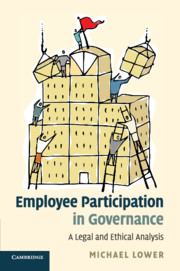Book contents
- Frontmatter
- Contents
- Acknowledgements
- Tables of legal instruments
- 1 Introduction
- 2 Catholic Social Thought: nature, sources and core principles and values
- 3 Catholic Social Thought and work
- 4 Catholic Social Thought, private property and markets
- 5 The corporation
- 6 The firm and society
- 7 Employee participation in corporate governance: an ethical analysis
- 8 Corporate Governance in the United Kingdom
- 9 Labour law and employee participation
- 10 Employee participation and EU corporate governance
- 11 Conclusion
- Bibliography
- Index
7 - Employee participation in corporate governance: an ethical analysis
Published online by Cambridge University Press: 05 October 2010
- Frontmatter
- Contents
- Acknowledgements
- Tables of legal instruments
- 1 Introduction
- 2 Catholic Social Thought: nature, sources and core principles and values
- 3 Catholic Social Thought and work
- 4 Catholic Social Thought, private property and markets
- 5 The corporation
- 6 The firm and society
- 7 Employee participation in corporate governance: an ethical analysis
- 8 Corporate Governance in the United Kingdom
- 9 Labour law and employee participation
- 10 Employee participation and EU corporate governance
- 11 Conclusion
- Bibliography
- Index
Summary
Introduction
This chapter outlines the ethical case put forward by Catholic Social Thought (‘CST’) for giving employees a role in corporate governance and some type of ownership interest in the corporations that they work for. The first section provides some definitions of corporate governance and considers the ethical significance of a corporate governance system and the impact on employees of the theory of the firm (and accompanying approach to corporate governance) that is adopted. The following section offers a definition of employee participation and explains its ethical and economic advantages. It outlines the German system and explains that co-determination has never taken root in the United Kingdom. This section concludes with a brief explanation of some alternatives to co-determination as ways of building employee interests into corporate governance. The third section looks at the question of employee ownership. Again, it notes the ethical and the economic arguments in favour of employee ownership. ESOPs are one possible way forward and they can have a significant impact on employees and on corporate governance. Badly designed forms of employee ownership could harm both the firm and its employees. The article gives some indications as to why this is so. It assumes, nevertheless, that these problems can be surmounted or avoided. The governance structure of the John Lewis Partnership plc is explained in some detail and is offered as a possible model for employee-owned businesses. Finally, the article will look at the case for the introduction of mandatory co-determination systems.
- Type
- Chapter
- Information
- Employee Participation in GovernanceA Legal and Ethical Analysis, pp. 92 - 128Publisher: Cambridge University PressPrint publication year: 2010
- 1
- Cited by

